Uncover the shocking tales of biblical fathers who missed the mark, and discover the profound lessons they inadvertently teach us.

Examples of Bad Fathers in the Bible
Don't you just love how biblical figures, though esteemed as paragons of virtue, often failed spectacularly at parenting? Consider King David, who, despite his many victories, couldn't quite score a win in the fatherhood department.
Or ponder over Lot's selfish decisions that put his daughters in harm's way. And what about Eli's negligence, Manoah's lack of guidance, or Isaac's blatant favoritism?
Intriguing, isn't it? It's almost as if these stories were designed to teach us something… but what could that be?
Let's find out together, shall we?
Key Takeaways
- Biblical fathers like King David and Eli exhibited poor parenting through neglect and indifference, leading to family conflicts and tragic outcomes.
- Lot's selfish decisions jeopardized his family's safety and contributed to their tragic demise, demonstrating the implications of self-interest in parenting.
- The lack of guidance and moral leadership from fathers like Manoah resulted in the downfall of their children, emphasizing the importance of proper guidance.
- Isaac's favoritism towards one son caused resentment and division within the family, showing the damaging effects of unequal treatment among siblings.
King David's Parenting Failures

Diving into the turbulent narrative of King David, we find numerous instances of his parental shortcomings, particularly evident in the tumultuous lives of his children. The most prominent issue was David's absenteeism, which left a significant impact on his offspring.
In analyzing the biblical accounts, you'll notice a pattern of neglect. His failure to address Amnon's deplorable act against his sister Tamar, and Absalom's subsequent revenge, testifies to this. David, consumed by the demands of his kingship, often failed in his personal role as a father. His neglect of his children's grievances and conflicts led to an escalation of tensions, ultimately culminating in tragic consequences.
The consequences of neglect are severe and far-reaching. Absalom's rebellion against his father, for instance, was a direct outcome of David's indifference to his son's anger and grief. This led to a full-blown rebellion, causing much strife within the kingdom and David's own family.
The Selfishness of Lot
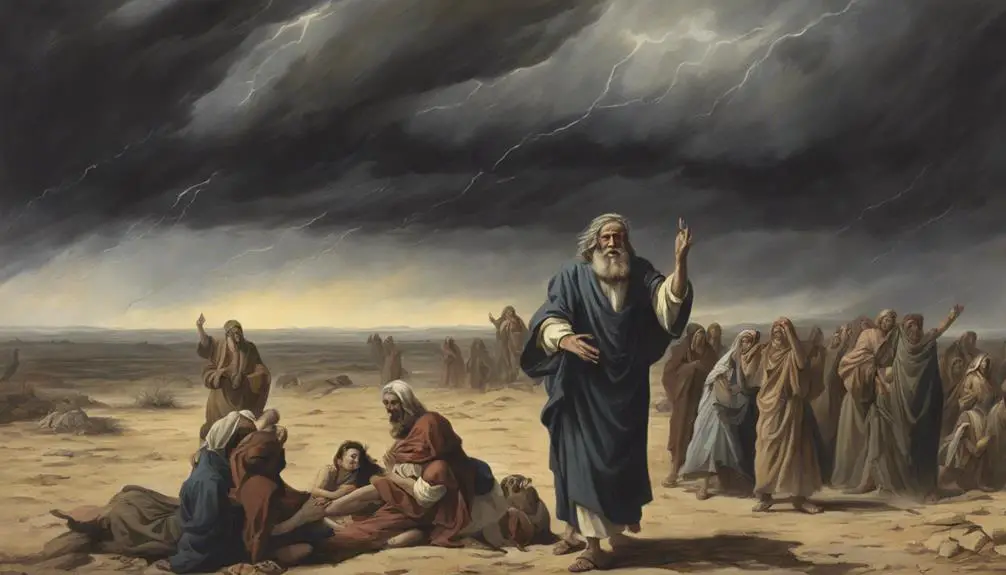
Lot's narrative, a stark contrast to the story of King David, reveals a father consumed by self-interest, often making decisions detrimental to his family's welfare. Lot's choices, driven primarily by greed and personal gain, resulted in considerable suffering for his family.
Analyzing Lot's life, you'll see a pattern of self-interest consequences. When given the choice between the fertile plains of Jordan and the less prosperous land, he chose the former, showing blatant disregard for his family's safety amidst wicked cities. His decision to offer his two daughters to the mob in Sodom further underscores his selfishness, putting his reputation above his daughters' wellbeing.
Furthermore, Lot's reluctance to leave Sodom, despite the impending divine judgment, is another testament to his selfishness. He was more concerned about losing his possessions than preserving his family's lives. This delay led to the death of his wife, who, overwhelmed by the loss, looked back and turned into a pillar of salt.
Eli's Negligence as a Father
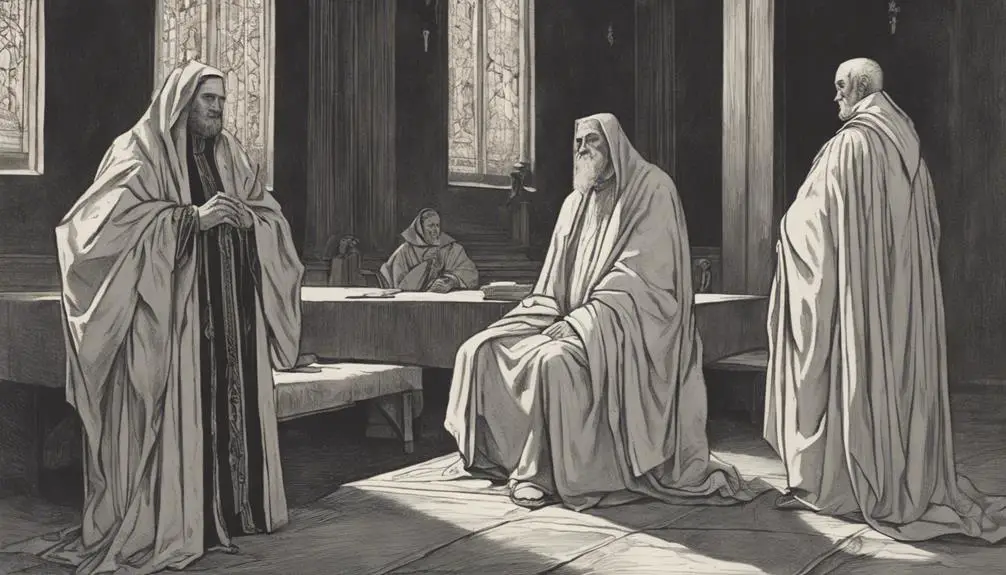
While Lot's selfishness led to the ruin of his family, another biblical figure, Eli, presents a different yet equally damaging form of poor fatherhood: negligence. Eli's story is a chilling tale of priestly indifference and unchecked sinfulness.
One could argue that Eli's primary failing was his passiveness in the face of his sons', Hophni and Phinehas, egregious behavior. His unwillingness to punish or even rebuke them for their sins was a clear display of negligence.
This neglect can be broken down into three main elements:
- Eli's misplaced priorities: He prioritized his priestly duties over his responsibilities as a father, an example of 'Priestly Indifference'.
- Eli's inaction against sin: Despite knowing about his sons' wicked actions, Eli did nothing to correct them, a case of 'Unchecked Sinfulness'.
- Eli's failure to instill moral values: His sons lacked a moral compass, a direct result of Eli's negligence as a father.
Eli's negligence had dire consequences – his family line was cursed, his sons died on the same day, and the Ark of the Covenant was captured. Indeed, Eli's story serves a stern reminder of the disastrous outcomes of parental neglect.
Manoah's Lack of Guidance
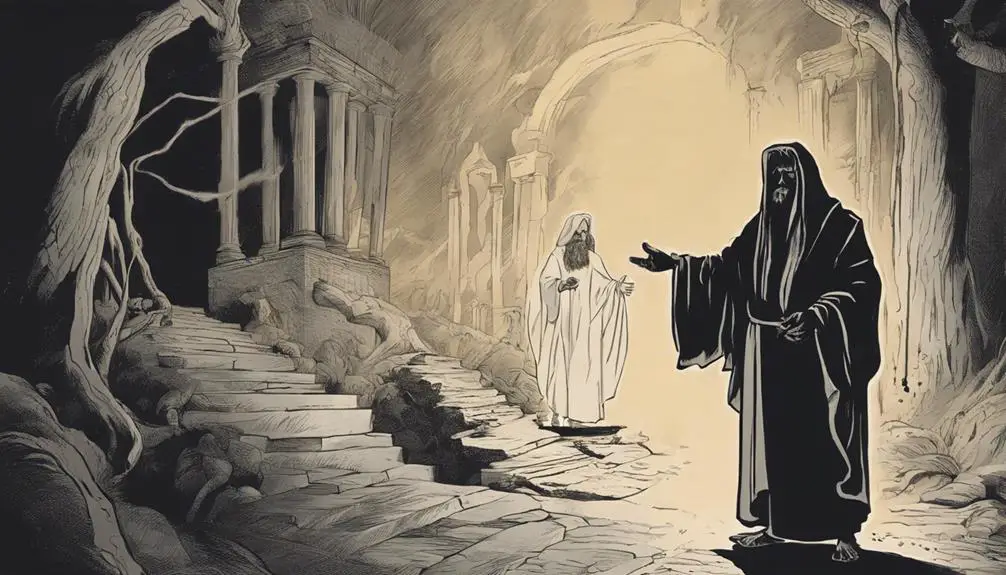
Shifting our focus to Manoah, we find a father who, despite his good intentions, fails to provide the necessary guidance for his son Samson, demonstrating yet another form of harmful paternal conduct in biblical narratives. His flawed parenting, dubbed as 'Manoah's Missteps', is marked by a significant lack of spiritual leadership, leading to Samson's moral and spiritual downfall.
Manoah's failure to instill in Samson the gravity of his Nazirite vow, which was divinely ordained even before his birth, is a glaring example of his lack of guidance. He's unable to guide his son through the complexities of this sacred commitment. This lapse in spiritual leadership translates into Samson's reckless behavior, as he consistently breaks his Nazirite vow without understanding the consequences.
Furthermore, Manoah's inability to discern the true nature of Samson's Philistine wife and advise him accordingly, further exhibits his inadequacy as a spiritual mentor. His lack of discernment, coupled with his failure to foresee the disastrous outcome of his son's misguided alliances, underscores the profound repercussions of his misguided paternal approach.
Isaac's Favoritism Problem
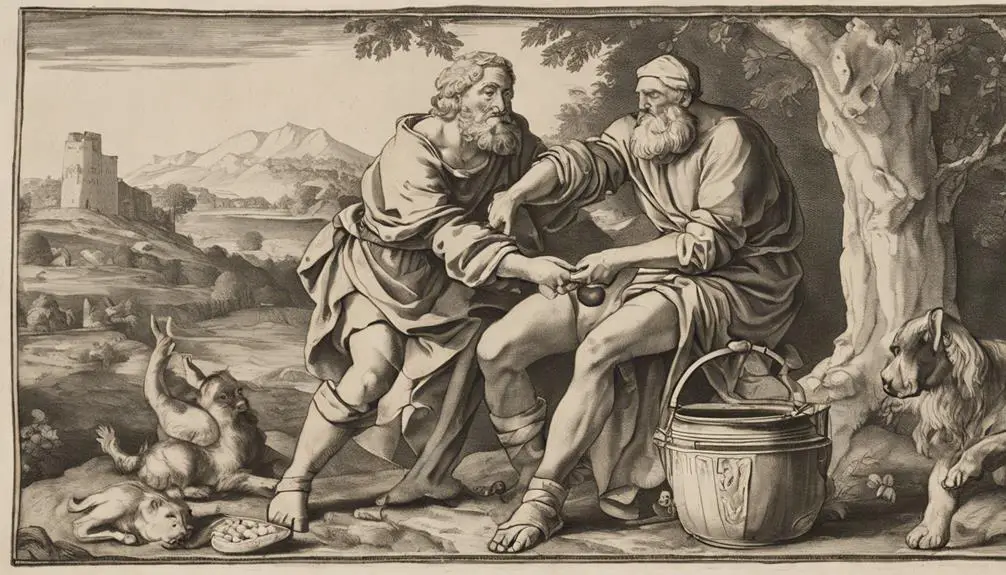
Turning our attention to Isaac, we encounter a father who exhibits a damaging favoritism towards his son Esau, setting the stage for familial discord and deep-seated resentment in yet another biblical narrative. This episode illuminates Isaac's partiality, where the patriarch's preferential treatment of Esau over Jacob cultivates an environment of rivalry, jealousy, and deceit.
- Isaac's favoritism is evident when he requests Esau to hunt and prepare his favorite meal, promising him a blessing in return.
- The consequences of his favoritism are seen when Jacob, feeling overlooked, deceives Isaac and steals Esau's blessing.
- This act strains the sibling relationship, triggering a chain of events that extend far beyond their immediate family.
Isaac's favoritism consequences aren't just confined to his immediate family but ripple outwards, impacting generations. His failure to equitably love and bless his sons results in a divided family and a lineage marked by strife. By favoring one child over another, he sets a precedent that fosters resentment and conflict. As such, Isaac's story serves as a sobering reminder of the long-lasting implications of parental favoritism and the importance of fair treatment among siblings.
Frequently Asked Questions
What Are Some Examples of Good Father Figures in the Bible?
You're seeking examples of good father figures in the Bible, and there are plenty.
Let's start with the concept of Divine Paternity in Scripture, where God himself is presented as a loving, caring father.
Another well-known example is the Prodigal Son's Father, who shows unconditional love and forgiveness.
These figures demonstrate the ideal qualities of fatherhood: love, patience, forgiveness, and guidance.
How Did the Actions of These Fathers Impact the Development of Their Children's Character?
You're exploring how a parent's actions shape their child's character development. Imagine growing up with negative role models; it's likely you'd adopt some undesirable traits. In contrast, positive influences can foster admirable qualities.
It's about the child's perspective, their interpretation of their father's actions, and how they choose to incorporate or reject those behaviors. It's an intricate process, full of complexities, and the impact can last a lifetime.
How Does the Bible Address the Issue of Parental Responsibility and Accountability?
You'll find the Bible addresses parental responsibility and accountability quite directly. It emphasizes the Biblical consequences of negligence, outlining repercussions for failing to properly guide and nurture children. God's expectations for parents are clearly stated – they're to instill values, provide care, and show love.
Any neglect or violation of these duties isn't taken lightly. So, you see, the Bible underscores the importance of responsible and accountable parenting.
Were There Any Instances Where These Fathers Tried to Correct Their Mistakes or Seek Redemption?
You might ponder if individuals who've made parental mistakes ever sought forgiveness or took corrective measures. It's not uncommon for people to reevaluate their actions, seeking redemption.
However, the degree to which they genuinely repent and make amends can vary greatly. Remember, it's not just about regretting past actions, but about actively working to rectify them.
The pursuit of redemption is a journey, requiring genuine remorse and a commitment to change.
How Can the Stories of These Fathers Be Related to Modern Parenting?
When relating the stories of these fathers to modern parenting, you can learn valuable lessons. By comparing Biblical failures to modern missteps, you'll see that consequences still exist for poor parenting choices.
Lessons from Biblical bad dads can serve as cautionary tales, emphasizing the importance of communication, respect, and responsibility in a parent-child relationship. It's not about perfect parenting, but about learning from mistakes and continually striving for improvement.
Conclusion
In examining the failings of King David, Lot, Eli, Manoah, and Isaac, you've seen the consequences of parental neglect, selfishness, and favoritism. These biblical figures serve as stark reminders that fatherhood demands more than mere biological paternity. It requires guidance, fairness, and selflessness.
Despite their accomplishments, their failures as fathers underline a crucial point: the importance of good parenting for the well-being of children and the continuation of righteous lineage.

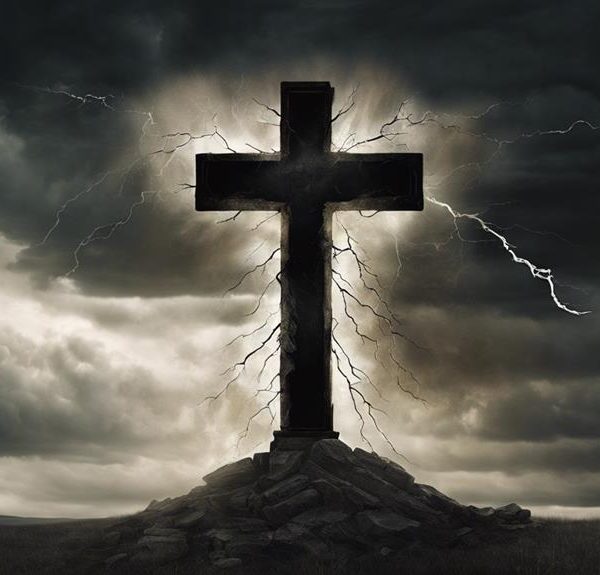

Sign up